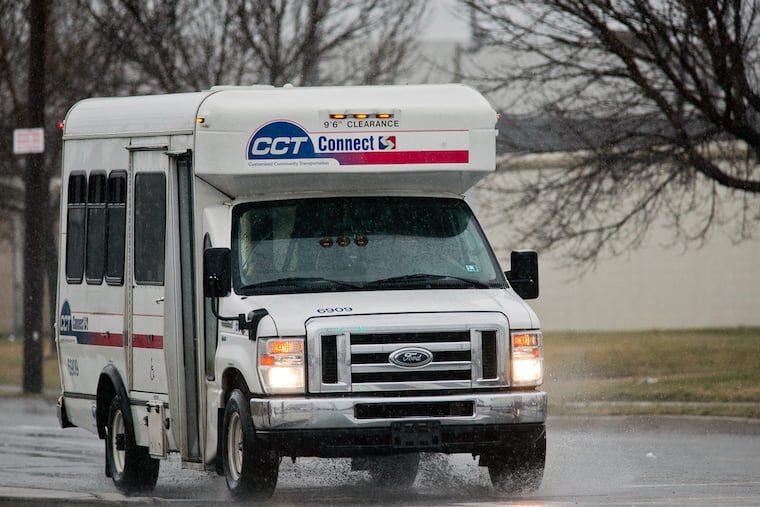SEPTA transportation for seniors and disabled not working for many
Senior citizens and disabled commuters fed up with SEPTA transport

THERE WAS something familiar about James Williams' hushed cellphone conversation in my lung doctor's office.
"It's just a few blocks," he said.
"She can't walk that far," he said.
Finally: "I waited 25 minutes on the phone for you to tell me you can't do anything?"
While his mother was being seen by the doctor, Williams told me he'd been talking to SEPTA's Customized Community Transport (CCT Connect), which provides transportation to elderly and disabled residents.
Except when it doesn't.
Williams' mom, 71-year-old Sharon Lyons, has health issues that make it hard for her to walk more than a few steps. She's on oxygen and uses a walker. Williams would usually drive her to her appointments, but his car was recently totaled.
So they scheduled an appointment with CCT. When they were dropped off, they discovered that the doctor had moved from Seventh and Spruce to Eighth and Walnut.
By the time they realized it, the van was gone. Williams hailed a cab and paid $8 for a three-block ride.
While his mom was seeing the doctor, Williams called CCT to see if a vehicle could pick them up at the office instead of where they had been dropped off.
CCT said no. And that meant another $8, three-block cab ride.
"It just makes no sense," he said. "They know the people they are picking up are old and sick and they don't seem to care."
For years, I've heard similar stories. Late pickups and drop-offs. Scheduling mix-ups. Long holds for the dispatch center.
A couple of years ago, Steven Smith, 29, a quadriplegic who is on a ventilator, shared horror stories about waiting for his ride home for so long that doctors' and nurses' shifts ended while he waited outside. Sometimes they'd wait with him until his ride arrived. He's started a GoFundMe page to raise money for a wheelchair-accessible van (https://www.gofundme.com/4fb9k8).
A few months ago, Yvonne Blake's 83-year-old mother, Norma, was erroneously listed as ambulatory, even though she's in a wheelchair. As Blake and her sister attempted to carry her mother down a few steps, the wheelchair slipped, nearly toppling her mother and injuring her sister. Blake said she eventually got an apology from SEPTA for inputting her mother's status incorrectly.
Have I just been meeting the unhappy customers, or is there a bigger problem with the system that serves some of the city's most vulnerable residents?
CCT is a big operation, 7,500 rides on any given weekday between its ADA paratransit service and shared-ride program. There are 457 vehicles among six contractors overseen by SEPTA. Because of the volume, appointments must be made at least a day in advance. They try to book customers within two hours of their request times, but during peak hours, I was told, customers have to be "flexible." Rides can be scheduled to arrive at the customer's pickup location 10 minutes before and up to 20 minutes after the scheduled time. Again, SEPTA officials said, "flexibility" is key.
But what of CCT's flexibility? As much as SEPTA officials preached the need for customers to be flexible, they were surprisingly inflexible when talking about a dependent group of people. Not what I expected from an agency with a usually customer-friendly attitude.
After discussing Lyons' case, they said their hands were tied. State and federal policies prohibit same-day trips - and apparently, driving a few blocks to pick up a sick, elderly woman would be considered a new trip.
So is lobbying for flexibility, I guess? My pleas for customer service, common sense, and compassion for Lyons didn't go very far.
The assistant general manager of public and government affairs, Francis Kelly, said the major problem is that customers weren't being held accountable to each other, which is why they cracked down on riders who were consistently late or no-shows. The crackdown decreased complaints and improved service, Kelly said.
Smith, the quadriplegic, admitted that he was once suspended for canceling trips. But he said he often canceled because the ride was late and there was no way he'd make his scheduled doctor's appointment.
You know what aren't as flexible as CCT customers are expected to be? Doctor's appointments.
These are not average commuters. These are elderly, disabled, and sick riders who often have no other transportation options, who are at the mercy of a system that has made some improvements, but still needs to make more to better serve its neediest customers.
Riders like 69-year-old Loretta Eberle, whose daughter took to Twitter in October to complain about CCT being late to pick up her mom for dialysis. Her daughter, also named Loretta, said late pickups meant her mom was forced to cut short her treatment for renal failure because she didn't want to miss her only ride back home.
She tweeted: "CCT late AGAIN for my mother's ride to dialysis. Making a kidney patient anxious twice a week . . . @SEPTA what can we do about this?
Eberle wasn't just venting; she hoped that calling them out publicly would help. And it did. A member of SEPTA's social-media team responded to her tweet, and Eberle said service has been better. But she joked that if publicly criticizing CCT leads to repercussions, I'd have to start driving her mother to her appointments. Others feared speaking out, too.
"At this point it's the only mode of transportation I have to get around," Lyons said. "Some kind of transportation is better than none, even if it's not that good, so I don't want to make anyone mad."
It's hard to argue with someone who doesn't have other options. But it sure makes it easy to leave them stranded.
215-854-5943 @NotesFromHel
Helen.Ubinas